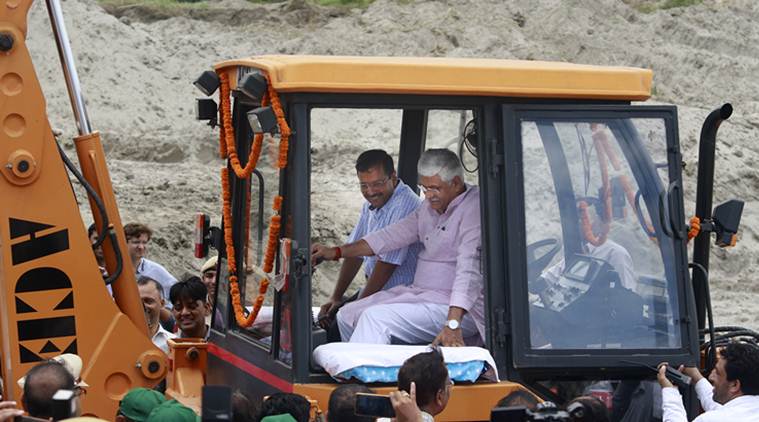
Union Jal Shakti Minister Gajendra Singh Shekhawat and Delhi Chief Minister Arvind Kejriwal Friday inaugurated a pilot project to store overflowing water from the Yamuna in its floodplains. The plan is to retain excess monsoon water in shallow reservoirs dug out on the floodplains of around 40 acres, north of the capital near Haryana. This would recharge groundwater in the area which can be extracted to meet Delhi’s growing water demand.
At the inauguration in Sungarpur village, Shekhawat said availability of water was a challenge across the world: “I wish this pilot project is successful and that in time, it is accepted not only in the nation but across the world as the Delhi model.”
Also read | Yamuna floodplains project: Seeking relief, farmers say govt should have waited for harvest
He also commended the method through which the project aims to store water — by removing the top layer of soil to a depth of around 1 metre. Nature of the soil is said to be sandy below that depth, as a result of which water would percolate into the ground at a faster pace. Official estimates indicate a percolation rate of around 4-9 metres per day.
Kejriwal thanked Shekhawat for helping the project receive necessary clearances from the Centre in around two months: “Whenever we faced any problems, when we applied to central agencies… I would phone Shekhawat ji and he would get us the permission in 24 hours.”
He added that the pilot would study the direction, distance and speed at which water percolates, which would help the government understand the quantum of groundwater that will be recharged when the project is extrapolated to an area of more of more than 1,000 acres next year. “We hear about many areas in the country where water level has dipped severely, causing problems. If this experiment is successful, I think it would give a direction to the entire nation,” he said.
Delhi Irrigation and Flood Control Minister Satyendar Jain said, “The government is embarking on an important project… We promise that… by 2022, the problem of drinking water in Delhi would be permanently solved.”
The department has started creating reservoirs on floodplains with a deadline of a week to 10 days, after which officials expect the flooding cycle to begin. A number of JCB machines could be seen ploughing the land.